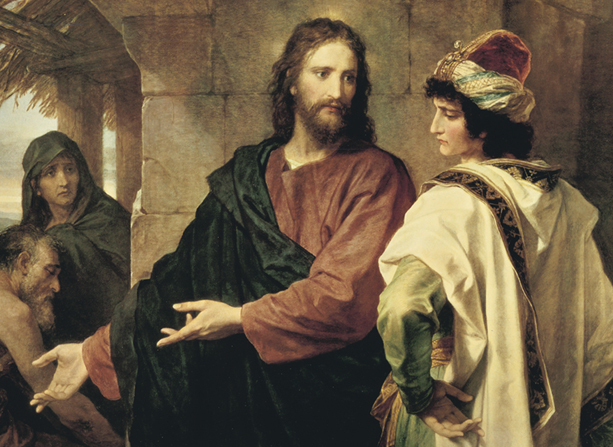“As He was going out on the road, one came running, knelt before Him, and asked Him, “Good Teacher, what shall I do that I may inherit eternal life?” 1 2
I think it’s fair to say this portion of Scripture has been read, recited, quoted, and taught countless times, and more often than not, concluding the central point of this story illustrates the difficulty people of wealth have forsaking their wealth and following Christ. This conclusion is acceptable, but preconceived ideas and notions can rob us of the opportunity to expand our knowledge of the text before us. Let’s not judge the man in this story too harshly or quickly. Let’s not be so quick in our summation that we overlook the innocent spiritual ignorance of this young man.
The innocence he shows in the first question he asks Jesus, what shall I do, and bewildered by the answers Jesus gives him. This young man’s inquiries and lack of understanding of spiritual matters is not uncommon. We often seek knowledge from God on how or what to do, and more frequently than not, we have difficulty understanding God’s answer. So, with fresh eyes, let’s re-examine this story.
This story is in three of the four Gospels, but I have selected Mark’s account of this meeting. The gospel accounts are all accurate. Yet, they differ in specific details, which is what we expect since they are recorded by four different men, each with his own personality, mindset, and awareness based on his life experiences and how he views the world.
For example, the central theme of the Gospel of Mathew records the events of the king and the kingdom. Mathew opens his Gospel with the lineage of Jesus as the rightful king and His actions proving He is the King of Kings, God’s appointed ruler and redeemer of mankind. Luke is an analytical historian, so his Gospel contains more historical details. Details the other Gospels omit or see as unnecessary to their central theme. John’s Gospel depicts Jesus as divine. The only begotten and divine Son of God, who was with God from the beginning of creation, who came in the flesh to complete a task that He could only accomplish in the flesh.
Mark’s Gospel is written from a more human point of view, so emotions, feelings, Jesus’s interactions, and human reactions are appreciated by Mark and thus recorded in his Gospel. We must remember that Jesus was both one hundred percent human and divine. Mark was keen to notice the human aspect, the everyday actions of those Jesus came in contact with, like the widow’s two mites. Jesus’s heralding of this woman’s giving all that she had undoubtedly struck a tone of sentiment in Mark, and he thought it an essential inclusion in his Gospel.
Jesus wept and expressed disappointment, sorrow, and anger, emotions all recorded in Mark’s Gospel. They are all real and very human. This human point of view is why I chose Mark’s account. The human aspect of this encounter is crucial to our understanding of this conversation. We will walk through this encounter, briefly expounding it verse by verse.
So again, “As He was going out on the road, one came running, knelt before Him, and asked Him, “Good Teacher, what shall I do that I may inherit eternal life?”
Let’s begin with who this person running up to Jesus is. Verse 17 doesn’t tell us the man was rich. We only find out about his wealth in verse 22, but from the very outset, Jesus knew. The verse does give us some helpful information. We can ascertain he was a man of manners, most likely a younger man, for “he knelt before Him,” addressing Jesus with respect and prefacing his question with “Good Teacher.” Keeping with the day’s customs, had he been an older man, he would have bowed as a show of respect. The young man must have recognized Jesus, for he could pick him out from enough distance for him to come running up to him.
Addressing Jesus as a Good Teacher and not a Rabbi gives us a little insight into this young man’s religious upbringing and hints at his view of Jesus. The Greek term didaskalos in English means‘ a teacher, an instructor acknowledged for their mastery in their field of learning; in Scripture, a Bible teacher, competent in theology.’ To this young man, Jesus was perhaps a master teacher, hence the adjective good in his addressing Him and quite well known.
His omission of rabbi indicates a lack of personal connection with Jesus, for the term rabbi adds my connotation to the term teacher, making the complete definition my teacher. He didn’t recognize Jesus as the messiah; he saw Jesus as a master teacher and not as his teacher but as one worth seeking answers to his questions. He does not ask, ‘What must I do to be saved?’ or ‘What must I do to obtain forgiveness of sin,’ or ‘What would God have me do.’ It’s as if he is seeking advice on forever enjoying what he currently has. Jesus doesn’t rebuke the young man. At first, Jesus tries to change the young man’s focus by redirecting the conversation.
“And Jesus said to him, “Why do you call Me good? No one is good but One, that is, God. You know the commandments, ‘Do not commit adultery, Do not murder, Do not steal, Do not bear false witness, Do not defraud, Honor your father and Mother.’” (verses 18-19).
Jesus asks him, “Why do you call me good?” How can you tell me if I’m good? You have decided based on what? You have yet to comprehend my identity; if you were to recognize me for who I really am, the answer to what was needed to obtain eternal life would be clear. The man failed to recognize Jesus for who He was, only seeing Him as a man, a teacher.
Now, the fundamental divide between the physical and the spiritual is exposed. Up to this point, the young man thinks his duty to God is to keep a set of rules and thereby be blessed by God, measuring his obedience by his prosperity. Keeping the law, observing the Ten Commandments, and the hundreds of other rules and regulations added by Judaism. But Jesus’s response catches him off guard.
I recently shared a couple of messages entitled ‘Clean missed it.’ The subject text was not this portion of Scripture; however, while prepping this article, I found another ‘clean-missed-it’ in this conversation. Do you see what it is? Did you catch it? It’s this, in the form of a question: Which of the Ten Commandments is “Do not defraud?” You can review the list in Exodus twenty if you wish, but you will find this is not one of them. Jesus again is trying to change this young man’s way of looking at his relationship with God, and he missed it just like many of us miss God’s quiet instruction. For he readily replies in this manner.
“And he said to Him, ‘Teacher, all these things I have kept from my youth.” (verse 20). The young man’s answer tells us that he was unaware of what Jesus was trying to get him to see, but he was approaching the problem of obtaining eternal life from the wrong angle. In His eyes, his morality satisfies his obligation to God. And his comfortable lifestyle is its own evidence. Jesus intentionally inserted this commandment into the list of the commandments to again point out that what he was seeking couldn’t be obtained as was his wealth, and the fact that he said he had kept this commandment proves the miss.
Some things in our day and society that we take for granted were not available to people in Jesus’s time, such as capital accumulation based on ideas or hard work. The people of His day lived not only under Roman rule but also under a caste system. If you were born poor, you would likely die poor unless you were a thief, murderer, or traitor. There were no means of climbing the corporate or social ladder to success. No, your social strata was a matter of birth. This young man inherited his wealth.
But inheriting eternal life seemed to be an impossibility to this man, and rightfully so. You cannot inherit eternal life; you must obtain eternal life, but how? You can not earn eternal life, but it is gifted. In Mathew’s account of this meeting, the question first posed to Jesus is worded slightly differently, “what good thing shall I do that I may have eternal life?” 3 This wording shows the young man’s struggle with being able to be born into wealth, yet knowing one cannot be born into eternal life, there must be something he can do to obtain it. He fails to grasp that eternal life is a spiritual matter that cannot be earned nor passed on from generation to generation, and earthly possessions have no place there.
“Then Jesus, looking at him, loved him, and said to him, ‘One thing you lack: go your way, sell whatever you have and give to the poor, and you will have treasure in heaven; and come, take up the cross and follow Me.’” (verse 21).
Some, consciously or subconsciously, think they will have the same position in heaven as they do in this life. Because they are people of position or wealth, they assume they will be likewise in the next life. Perhaps this young man felt the same. He had wealth, which brought a certain amount of respect. He lived comfortably and was moral; surely, wealth would always be part of his future.
The Jews thought that they were entitled to eternal life, and this was all but guaranteed if they kept the commandments and died within the borders of the promised Land. Our Lord shatters this belief. The young man is well-versed in the Ten Commandments. Jesus informs him the pursuit of eternal life is not and cannot be secondary to your possessions, no matter how great they are, nor can your morality.
Jesus told the young man what he needed to hear, not what he wanted. So he walked away, forsaking salvation and true riches in heaven. He couldn’t see gain, only loss. Yet he lost what he was seeking. The pull of the world is strong, and the more of the world you have and enjoy, the stronger its pull. It’s easier to trust what you see and possess than to trust what you cannot see and don’t possess. You must be willing to give what God asks and forsake what hinders you. Little or much, rich or poor, few or many possessions, each can hinder salvation and living for God.
Refrain from thinking because the focal point of this story is a rich person, or its lessons only apply to people of wealth. There are as many stingy poor people as there are rich people. There are as many poor people who turn away those in need as do the wealthy. No, this story is about any level of wealth and possessions.
In the end, this rich young man is saddened, for it was only then that he realized he was not entitled to eternal life, nor could he earn it. Eternal life cannot be inherited. Wealth, position, and even poverty can close your eyes to the way to salvation. Only when we are willing to let go of temporary things can we see the need for salvation and find it simultaneously.
We must not overlook the innocence of this young man. He was looking for one thing: he couldn’t figure out how to obtain eternal life and never realizing what he had kept him from seeing what he needed. Jesus ‘loved him’ because He understood the young man’s over-concern about the temporal things of life and his ignorance of the eternal. In innocence, he missed what was essential and held on to the unimportant, his great possessions.
There is another matter we must consider. Do you think Jesus listed “Do not defraud” in the commandments recited to trick him? No, it was intentional, for it has a bearing on the problem of his many possessions. The Greek word apostereó in English means ‘defraud’ and can also be rendered and is more fitting to the text as ‘to deprive of.’ Who was the young man depriving, and what was he depriving them of? We find our answer in what Jesus told the young man to do. “One thing you lack: go your way, sell whatever you have, and give to the poor.” Do not sell what you have and give the money to us. Who were the poor Jesus was referring to? The young man’s neighbor is the one Jesus refers to and is the 2nd greatest commandment, “You shall love your neighbor as yourself.” 4 By not sharing his wealth, the young man was depriving (defrauding) his poorer neighbor. We cannot live in a bubble and serve Christ. Look at it this way: the young man was well brought up, well educated in the things of the Lord, and followed the commandments, but those actions were matters of spiritual self-obedience. We are to give of ourselves and our possessions in the furtherance of the Gospel. We have an abundance of self-love and a lack of love for our neighbor.
The Apostle John reminds us of the inappropriateness of living our Christian lives in a bubble, “But whoever has this world’s goods, and sees his brother in need, and shuts up his heart from him, how does the love of God abide in him?” 5
“And you shall love the LORD your God with all your heart and with all your soul and with all your strength.”6 This verse was not part of this conversation; there was no need. There was no need to address the first and greatest commandment when the young man couldn’t see the reality of the 2nd. We cannot truthfully say we comprehend a commandment, like the 2nd if we don’t put it into practice in our own lives; we only know the commandment as something theoretical, and faith is not theoretical; it is action.
The piece missing in this encounter was the point of focus. While this young man has questions about obtaining eternal life, he is lost on how to get it. He was also unaware of the cost of eternal life and his unwillingness to pay it. Yet how ironic was it that the wealth he was unwilling to relinquish wasn’t something he earned? His wealth cost him nothing; it was inherited, not on merit, but by birth. But it was his wealth that was keeping him from what he sought. Jesus tells the young man he won’t give up anything that God will not replace many-fold in the next life, in the eternal life he seeks.
Only then would he find the answer he sought. What we miss often holds the key to the answer we seek.
1 Unless otherwise noted, All scripture quotes are from the New King James Version.
2Mark 10:17
3 Mathew 19:16
4Mark 12:31 Leviticus 19:28b
5I John 3:17
6Duet. 6:5







+ There are no comments
Add yours